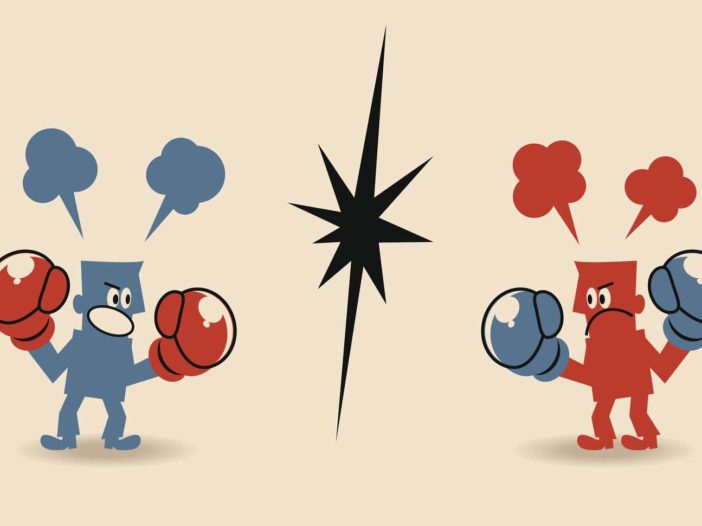
Every lawyer knows the old adage: “When the law is on your side, argue the law; when the facts are on your side, argue the facts; when neither the law nor the facts are on your side, just argue!”
Memorable, sardonic, and a nod to the very human condition of wanting to “win,” this tip can frame a negotiating strategy. However, for most decision makers, arguments should yield to demonstrable facts, mutual understanding, and logical compromise, given that winning means closing a deal. That’s challenging when people make up their minds quickly based on what they already “know.” So, in an age when data and information are ubiquitous, how can CEO’s advocate and win when otherwise reasonable people take hard positions and believe unreasonable things? As always, they can start with a few good books.
Productive negotiations start with agreement on basic facts. We take for granted that smart people on “the other side” understand our goals, their own incentives, and the field of play for discussion. Increasingly, however, some conversations need to start at an even more basic level: can we agree that COVID is not a hoax or even that the earth is round? (Yes, you read that right.) Journalist Kelly Weill, author of the fascinating and unnerving new book, Off the Edge: Flat Earthers, Conspiracy Culture and Why People Will Believe Anything, a fascinating and unnerving new book, helps explain why. We humans always have sought patterns to explain the inexplicable and Weill traces the roots of today’s conspiratorial movements back to Flat Earth theory in the 1830’s. She does a masterful job of explaining how social media companies have learned how to combine basic human instincts with AI driven algorithms to keep us online longer even if the deeper we go and the questionable content we encounter leads to our own unraveling. This book is a must for tech leaders, especially anyone involved in designing ethical AI driven customer engagement.
Even if we can agree on basic facts, we still need to work through what they mean to both sides. That’s hard, especially now, and according to journalist/social entrepreneur Monica Guzman, we all need a strategy for intentional listening in our business and personal lives. In her insightful new book, I Never Thought of It That Way: How to Have Fearlessly Curious Conversations in Dangerously Divided Times, Guzman tells us how. I especially liked her “four things to try” formulation centered on: getting hypothetical, presenting the strongest argument for the other side, acknowledging your own attachments, and assuming absolutely nothing. As Guzman illustrates by interactions with her own strong-willed family and work colleagues, listening can be challenging, hearing even harder.
Yet, for most business leaders, the hardest challenge of all may be re-thinking what winning actually means. For more on that, I’d recommend the forthcoming book, Results: Getting Beyond Politics to Get Important Work Done, by Governor Charlie Baker and his former longtime chief of staff, Steve Kadish. Unlike many books by political figures, this isn’t a tell-all, nor does it focus on settling scores or framing a narrative for an upcoming campaign. Instead, Republican Baker and Democrat Kadish share what they have learned over the course of their private and public lives by distilling an incisive four-step framework based on competence, fact-based decisions, and measuring of results.
Notably, for Baker, the former CEO of Harvard Pilgrim, leading a state involves different priorities than heading a private company, but the challenge of finding solutions that work across conflicting, entrenched, and often distrustful constituencies is the same for many organizations, whatever the industry. I enjoyed learning how the team tackled day-today challenges ranging from the disfunction at the MBTA, human tragedies at the DCF, and the scramble to address the Pandemic and the rollout of the life-saving vaccines. Their disarming candor about what worked and what didn’t and their esemplastic methodology will be incredibly useful to any business leader. I certainly came away from the book with gratitude for a hard-working team committed to showing how government, although imperfect and bureaucratic, can “win” by making positive change and a real difference in peoples’ lives. This is tough, important, and ongoing work.
As for achieving goals when we seem so far apart? Maybe we need to refocus on the basics of finding common ground and understand that the opposite of losing often is not winning, but finding. In fraught and volatile times, starting with that definition of “success” can make all the difference in the world.
Read in the Boston Business Journal
Authors & Innovators is an occasional column by Larry Gennari, a transactional lawyer, law professor, and chief curator of Authors & Innovators, an annual business book and ideas festival. Gennari also teaches Project Entrepreneur, a business fundamentals bootcamp for returning citizens, at BC Law School.




